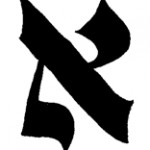Big alef & little alef – Vayikra
 It used to be the tradition to begin a child’s cheder education with the first chapter of Leviticus – Vayikra.
It used to be the tradition to begin a child’s cheder education with the first chapter of Leviticus – Vayikra.
The reason was that young children were pure and the sacrifices, the theme of Vayikra, were pure: the sages said, “Let the pure come and occupy themselves with that which is pure”.
In line with this tradition, the child who became the Tzemach Tzedek was taken to cheder on his first day by his grandfather, known as the Alter Rebbe, and the teacher began with Vayikra.
The child noticed that the first word in the book, meaning “And God called (to Moses)” is written with a small alef. He asked his grandfather why.
The Alter Rebbe first showed him that, whilst Moses is denoted by a small alef, in the Books of Chronicles Adam is written with a large alef.
The reason, said the grandfather, is that Moses, despite all his qualities of greatness, was humble, modest and self-effacing, and in writing about himself he made his ego, his alef, small; he did not want to give the impression that only he was great enough to have been called by God.
Adam, on the other hand, had little experience and was morally immature. Knowing he was the first human being, the progenitor of the future, he felt very proud of himself, and made his alef rather too ostentatious in order to ensure that history gave him proper acclaim.
In this comparison between two Biblical pioneers, the Alter Rebbe does not intend to suggest that individuals should lack a due sense of self-worth. If you have abilities and virtues, there is no reason to pretend to be a nobody when you are a somebody.
But at the same time, you should learn from Moses that you are not the only capable person on earth and you should ensure you do not become insufferably conceited.
A little humility goes a long way.



